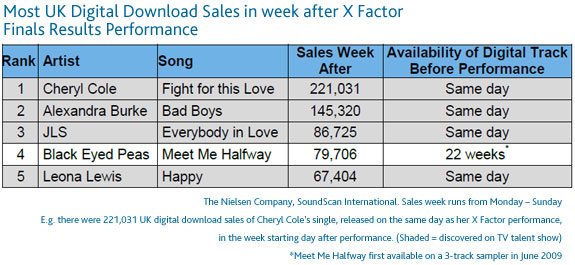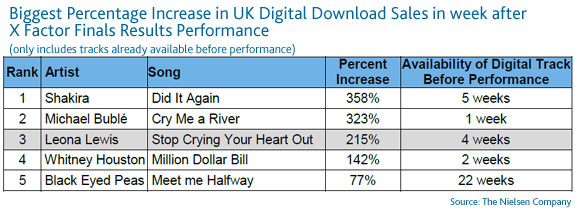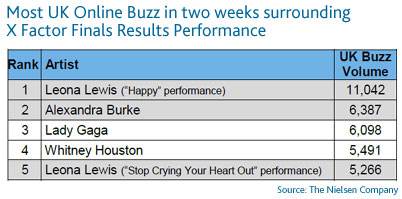A Nielsen Company analysis of the UK’s X Factor, reveals that guest stars originally discovered by talent shows saw the largest levels of sales, buzz and radio airplay.
UK Digital Download Sales
According to the recorded music industry trade body, the BPI, digital downloads account for 98 percent of UK single sales. Unsurprisingly, download sales for the song each guest star performed on the X Factor results show increased as, mostly, it coincided with the digital release of that single or album. However, tracks already available before to buy before the show also had large hikes in sales.
Four of the five guest stars who sold the most UK downloads of their song during the week following their appearance are TV talent show discoveries. Leading the way was Cheryl Cole, from Popstars: The Rivals winners Girls Aloud, who sold over 221,000 copies of her single “Fight For This Love” in the week after her performance. Cole was followed by 2008 X Factor finalists, Alexandra Burke (145,320) and JLS (86,725). After the Black Eyed Peas (79,706), 2006 X Factor winner Leona Lewis was fifth with 67,404 sales of “Happy” – her first of two 2009 finals performances.

An X Factor performance had a huge effect on tracks already available to buy. Shakira benefited most from appearing on the show, selling 358% more copies of “Did It Again” the week after the show compared to the week before – even though the track was available for purchase 5 weeks earlier. Michael Bublé’s “Cry Me a River” had already been available for a week before his appearance, via the album, but he benefited from a 323% increase in sales the week after the show. Leona Lewis’ performance of “Stop Crying Your Heart Out” – her second performance during the 2009 finals – contributed to a 215% increase in sales even though the track had already been available, via the album, for a month.

Online Buzz
For almost all the 18 guest stars promoting a track on the X Factor, online buzz in the UK increased after their performance. Only George Michael, Rihanna and Bon Jovi saw a decrease in online mentions or “talkability.” The eight most buzzed about stars during the fortnight around their appearance were all female, lead by previous X Factor winners Leona Lewis, around her “Happy” performance, and Alexandra Burke.

Just as the stars discovered by TV talent shows sold most digital download sales, they tended to benefit most in terms of increases in online buzz levels (87 percent average increase) around their X Factor performance than their counterparts who rose to fame through traditional avenues (45 percent). Susan Boyle (139 percent) and JLS (138 percent) benefited most in terms of increased buzz levels during the week commencing the Sunday of their performance, compared to the week before. Alicia Keys (130 percent) and Whitney Houston (114 percent) were the “traditional” artists with the greatest increase in levels of online buzz.
Radio Airplay
Westlife were the only guests for which the show was the debut airing of the song – all the others had their song broadcast on the radio for varying periods of time before their X Factor performance.
The most radio plays the week of a performance correlated almost identically with the most download sales – being dominated by the “TV talent show” guest stars. Cheryl Cole led the way (3,082 plays) followed by Alexandra Burke (2,748) and JLS (2,554). Leona Lewis’ “Happy” was fifth (2,069) but behind Whitney Houston (2,284) not the Black Eyed Peas.
In terms of increased radio airplay, Mariah Carey was, by far, the biggest beneficiary of an X Factor performance with a 297 percent increase in plays of “I Want To Know What Love Is” – despite the song having its first UK radio play 12 weeks earlier. Alicia Keys followed, with a 72 percent increase in plays of “Doesn’t Mean Anything,” its debut airing being seven weeks earlier. Third was Susan Boyle, with “Wild Horses” benefitting from a 71 percent airplay increase, six weeks after debut.
Jean Littolff, Managing Director, Nielsen Music Control, says: “The X Factor results program is a major marketing vehicle for established stars – particularly for those discovered through the TV talent show medium itself. This type tends to have most activity in terms of download sales, online buzz and radio airplays post performance. However, the greatest impact in terms of changing levels of activity pre vs. post performance is for artists who have travelled a more traditional route to fame.”
- For more information, download the full UK press release on the X-Factor.



